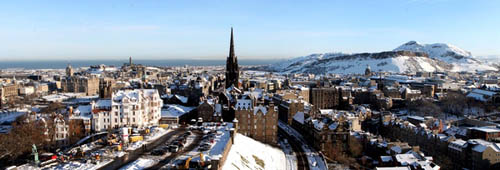AN influential magazine has caused fury by branding Scotland’s capital city a “dystopian wasteland”.
Scots author Irvine Welsh has joined politicians and tourism bosses to hit out at ‘Foreign Policy’ magazine after it claimed Edinburgh is paralysed and in decline.
The magazine was ranked #1 most influential read by influential U.S leaders in 2009.
The article, entitled ‘Scotch this plan: Scotland’s decaying capital shows why this country is not ready for independence’ was published on Wednesday.
It was penned by Richard Williams, professor of contemporary visual cultures at Edinburgh University.
The professor criticises the trams project and Edinburgh Waterfront scheme and says that the city is stuck in the past.
He also dubs Princes Street and the upmarket Stockbridge area as shabby and poor.
The article reads: “Due north of Princes Street, along the Firth of Forth, is Edinburgh Waterfront, a project to rebuild the city’s industrial ocean frontage. It starts promisingly enough in Leith with warehouse conversions and funky bars, but head a quarter-mile east and you find yourself in a dystopian wasteland of vacant lots worthy of a JG Ballard novel.
“The waterfront reaches its peak of despair at Granton Harbour where a handful of shoddy buildings emerge from a giant mud pool, the inadvertent result of stalled construction. Wrecked bicycles and shopping carts litter the scene.”
It continues: “Edinburgh struggles with the past as much as it struggles with the future. The result is a curious paralysis and a paradoxical sense of decline.
“The city’s difficulties are perhaps in microcosm those of a nation uncertain about its future. Before Scotland can be a country, its capital needs to get its house in order.”
Trainspotting and Porno author Irvine Welsh, who wrote A Visitor’s Guide to Edinburgh in 1993, said: “This is the strangest report I have ever read.
“It examines the mess and paralysis Edinburgh has been in for years under Unionist Westminster government, and draws the ludicrous conclusion that, due to this, Scotland isn’t ready for independence.
“Surely the state of Edinburgh as a tatty, run-down museum, economically and culturally stagnant, devoid of the vision and focus a true capital city needs, is precisely why it needs to be a de facto capital, not languishing in its weary, second-rate, neither-fish-nor-fowl status.
“It’s a bit like not allowing Andy Murray to hold a tennis racket, then saying he’s probably not good enough to compete at Wimbledon. Do they actually pay people to write this crap?”
Ill-informed
Edinburgh council leader Andy Burns also hit out at the article, calling it an “ill informed” piece.
He said: “They are also contradicted by the city’s continued popularity as a visitor destination and the many international awards cementing this reputation.
“Recently named ‘Europe’s Leading Destination’ at the World Travel Awards, Edinburgh is famed for its history and culture but is also known as a thriving, modern city.
“I would also like to draw the author’s attention to examples of very successful renovation projects in the Grassmarket, St Andrew Square and Multrees Walk.”
Malcolm Roughead, chief executive of VisitScotland, said: “Edinburgh is undoubtedly one of the finest cities in the world, boasting world-class visitor attractions, stunning vistas and historical splendour. Consistently, this awe-inspiring capital city tops the list of places to go for visitors while in Scotland.”
A spokesman from the Edinburgh Chamber of Commerce said: “Edinburgh is no different to any other city or town in the UK and has felt the effects of high-street closures and difficult economic times but the resilience of our members, retailers and businesses who work tirelessly to support the local economy, who have committed their future to the Scottish capital and have continued to thrive, should be applauded.”
Williams’s report touches on similar themes to the controversial “Skintland” article published last April in financial magazine The Economist, which provoked anger from First Minister Alex Salmond.
But Williams claims he did not intend to engage in a political debate, arguing he is “agnostic” on the subject of independence. He claimed that the magazine pushed the referendum angle, writing the headline and editing some parts.
Williams, who has lived and worked in the city since 2000, said: “However, what I would say, if you were a visitor here and you were looking for signs of some incipient new nation or a place that had confidence about where it was going, you wouldn’t find that in Edinburgh.
“I don’t think Scotland is uppity and needs to be kept down, it is more, if there is this serious debate about how it moves forward, ‘how is that represented in the built environment?’
“At the moment it looks like if you have a clear and longstanding majority against independence, then, in a curious way, that is represented in the built environment. It is a kind of apathy – there is not a clear majority for change.
“There seems to be a clear majority for things to stay as they are, and that produces the inability to think forward, it produces a sort of decay. If we were building lots of infrastructure then there would be a much more convincing sense that you could build a political project of independence or further devolution on the back of that.”


